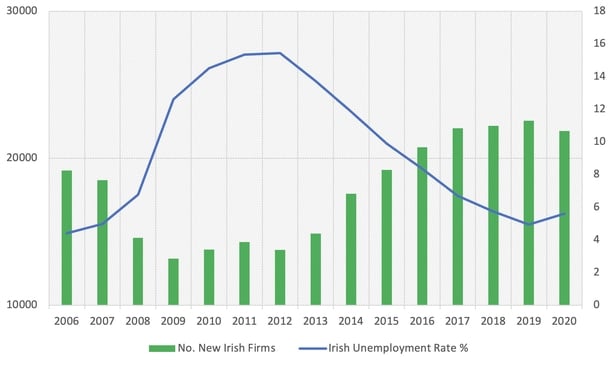Analysis: unemployment is usually viewed as a negative thing, but some believe it can be good for entrepreneurship
As of February 2023, Irish monthly unemployment was down at 4.3%. This is a healthy enough number and close to what economists would refer to as the natural rate of unemployment. It's the kind of inevitable amount of unemployment which arises due to people naturally shuffling around the labour market: college graduates looking for new jobs, employees leaving one position to pursue another or people opting out of employment due to new personal circumstances.
But not all of that 4.3% fall into these categories. Some will be newly unemployed because of business closures or redundancies. Furthermore, there are some fears that unemployment may increase in light of new ECB policies aimed at curbing inflation. Increasing interest rates is likely to decrease consumption, which may reduce business revenue and lead to redundancies. Increases in unemployment are by in large viewed as a negative thing, but some argue that rising unemployment can have benefits.
It seems counter-intuitive, but there is economic theory which predicts unemployment should be good for entrepreneurship. Not good in the sense that it makes entrepreneurship easier, but rather that it can increase rates of entrepreneurship. While this is a debated topic, some evidence of it can be seen in the below graph which looks at the number of new Irish businesses registrations compared to the unemployment rate.

The above graph shows that unemployment in Ireland surges upwards in 2007 and 2008 because of the great recession. New business registrations also drop in 2008 and 2009 as the financial crisis damages entrepreneurial optimism. However, in 2010 and 2011 we begin to see increases in new business registrations even though Ireland was still in the midst of a recession with increasing unemployment.
Why did this happen? Economic theory has a few suggestions. The first one is what's called necessity-based or push-factor entrepreneurship. Imagine an employee working at a firm. Maybe they don't love their job, but it’s a living. They have a great idea for a business but pursuing it would involve giving up their steady income, taking out a business loan and the risk of potential failure. They decide against their dream of entrepreneurship because the potential cost associated with it is too great.
We need your consent to load this rte-player contentWe use rte-player to manage extra content that can set cookies on your device and collect data about your activity. Please review their details and accept them to load the content.Manage Preferences
From RTÉ Brainstorm, 5 things women should know before starting a business
Now, imagine that that same person is made unemployed. One of their major fears about pursuing entrepreneurship has already been realised and they've lost their steady income. They still face the fears of taking out a business loan and risking failure, but they are already unemployed and staying unemployed won’t help their situation any further. So, they decide to finally pursue their business idea because the potential costs associated with becoming an entrepreneur have been reduced.
The second reason that unemployment may increase entrepreneurship is because of what’s called market room. This theory predicts that unemployment would be highly correlated with business closures and that increases in unemployment would mean reductions in the number of firms in the economy. When businesses close, this means theoretically that there should be an increased amount of market share or 'room' for new aspiring entrepreneurs to fill. Finally, business closures may also lead to the reallocation of resources back into the economy which can be seized upon by others.
We need your consent to load this rte-player contentWe use rte-player to manage extra content that can set cookies on your device and collect data about your activity. Please review their details and accept them to load the content.Manage Preferences
From RTÉ Radio 1's The Business, Siofra Mulqueen meets some successful business people who blanked university and college and went straight to work
So, theoretically, there are a few reasons that unemployment may increase entrepreneurship. Now for the important question, does it actually increase entrepreneurship? The answer is it can, but not always. New research from UCC indicates that the positive relationship between unemployment and entrepreneurship is confined to already high-performing regions. In lower-performing regions, the relationship between unemployment and entrepreneurship is negative so job losses actually decrease business creation. The reason for this is most likely attributable to what regional economists refer to as agglomeration economies. These are essentially benefits enjoyed by firms due to their location.
Consider a firm setting up in Dublin instead of rural Ireland. Basing operations in Dublin would have several benefits that wouldn't be available to firms in more rural areas. For example, the firm could benefit from greater access to consumers, suppliers, lenders and bigger labour pools. The dense population in Dublin could also better facilitate entrepreneurs getting new ideas for firms to set up by observing their many neighbours.
If Ireland is to see an increase in unemployment, we need policies that will help all our regions
Furthermore, individuals who are made unemployed in lower-performing regions may be more likely to migrate to higher-performing regions before they risk pursuing self-employment in their own region. Thus, it might be expected that setting up a business is easier in higher-performing regions.
If Ireland is to see an increase in unemployment, we need policies that will help all our regions. The corrective powers of the market may help recovery in the cities, but they may not do as much for rural areas.
The views expressed here are those of the author and do not represent or reflect the views of RTÉ








